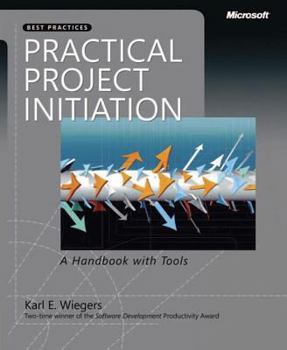Practical Project Initiation: A Handbook with Tools
Select Format
Select Condition 
Book Overview
Zero in on key project-initiation tasks--and build a solid foundation for successful software development. In this concise guide, critically-acclaimed author Karl E. Wiegers fills a void in project... This description may be from another edition of this product.
Format:Paperback
Language:English
ISBN:0735625212
ISBN13:9780735625211
Release Date:August 2007
Publisher:Microsoft Press
Length:211 Pages
Weight:1.05 lbs.
Dimensions:0.7" x 7.4" x 9.0"
Customer Reviews
5 ratings
Project Management
Published by Thriftbooks.com User , 15 years ago
Writer is awesome and right on. Book received in great shape and quickly. Recommend the seller.
Great advice with useful templates
Published by Thriftbooks.com User , 16 years ago
A key to running successful is getting them set up well--anticipating likely problems (not just risks, but also mid-stream changes, for which you'd want a change-control process). I also like that this book not only has solid advice, but also has good sample templates that you can use for many project-related documents.
Helps to start a project
Published by Thriftbooks.com User , 17 years ago
Project inception is the most difficult step for every project. If not done properly, the whole project is going to fail. In my opinion chapter 3 is the most useful. It concentrates not on how a project should be started, but rather on whether it should be undertaken. More often than not a project is doomed to fail and should not have been started in the first place. Therefore it is very important to concentrate on the right projects, which are those which are aligned with the business objectives of the enterprise. Chapter 11 describes a process called "wideband delphi" which is used to gain useful estimations. Wideand delphi allows a group of people to find more accurate estimates. After all a recommended reading for every manager and project manager.
Concise and Very Useful Practical Advice
Published by Thriftbooks.com User , 17 years ago
Approximately 200 concise pages of very good advice. Several useful tools. Another very good book from Karl.
Solid Advice, No Fluff, Great Tools
Published by Thriftbooks.com User , 17 years ago
There is one word that particularly comes to mind when I think of Karl Wiegers: solid. I've been reading Mr. Wiegers articles and books about software for at least a decade, and Practical Project Initiation is as solid as I've come to expect. I use the word "solid" specifically to describe the kind of advice that Wiegers offers, which is typically based on real world experience and research, never on conjecture, received tradition, or trends. Karl is all about doing software right and helping you do the same. There are several things I like about this book. First and foremost, I like that it is short and narrowly focused on the topic of starting new software projects--a neglected area to be sure. Much like Robert Galen's recent book Software Endgames focuses on getting a troubled project over the finish line, Practical Project Initiation focuses on the start of the process, with the idea of helping you keep your project from getting into trouble in the first place. At 200 pages, the book is short (by software book standards anyway) not only because the focus is narrow but also because Wiegers is concise; there is almost no fluff here. I think Wiegers knows that when you need a book like this, you need immediate help getting your project off on the right foot, not three months worth of study material. I was able to read it all the way through pretty quickly, and much of the material is designed so that you can come back to it later for reference purposes. The ironic part of what I've said about the book's narrow focus is that the first 25 pages of the book may actually be one of the best short introductions out there to the broad topic of project management. Another thing I really like about Practical Project Initiation is that Wiegers does not steer you in the direction of a particular process, or try to propose Yet Another Great Methodology, or try to convince you of the One Right Way to develop software. (In fact, I seem to remember an essay by Wiegers from a few years ago called "No New Models!") Weigers makes room for whatever methodology/process you are using, and if you're really not sure what methodology you are using or should be using, don't worry--just follow the foundation advice in this book, and you'll be okay. Another way of saying this is that, while the book overall does have a strategic scope, the focus of the material is very tactical. The tactics Wiegers suggests can be used on the most agile Agile project or the most formal "heavyweight" project. Before this review gets too long, I want to highlight the wealth of "tools" that come with this book. Many of these are tools in the literal sense, in the form of worksheets, checklists, and templates that are printed in the book and that can be downloaded for free. But the whole book is full of tools in the figurative sense also--things like the wideband delphi method for estimation, a feature triage process for figuring out what to include in the project when there's just too m





